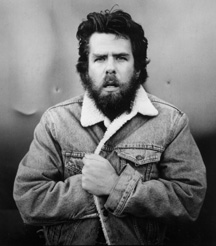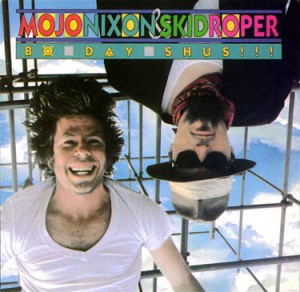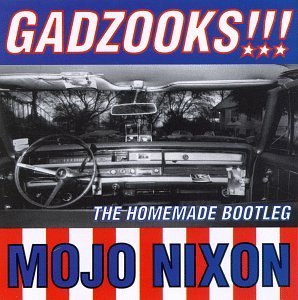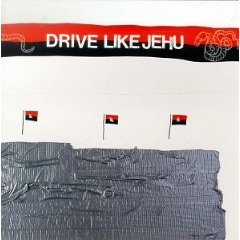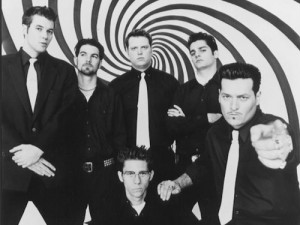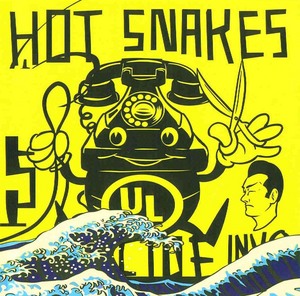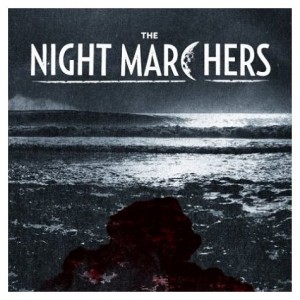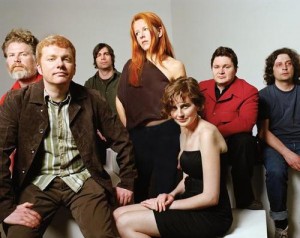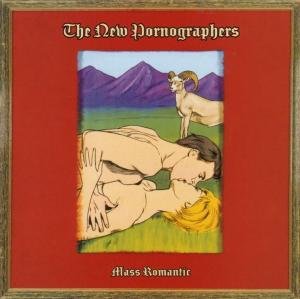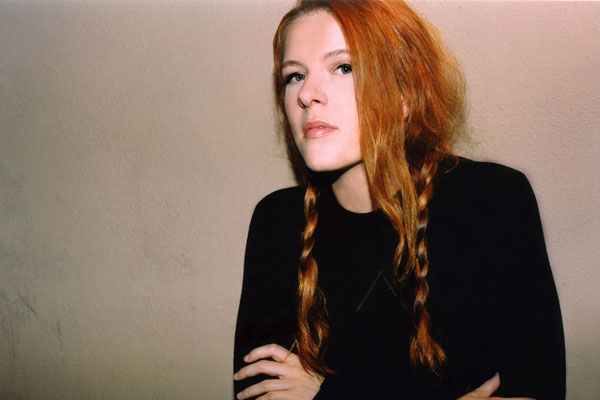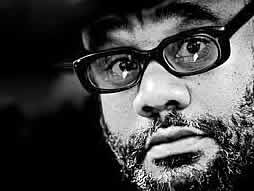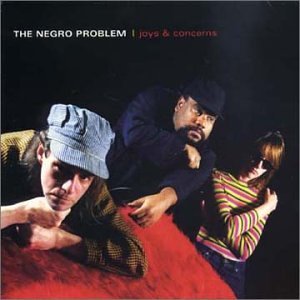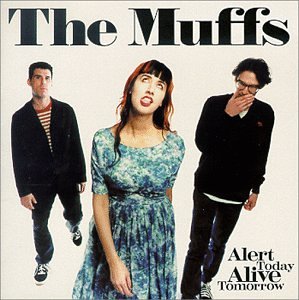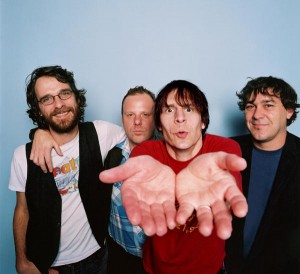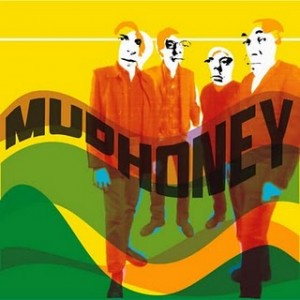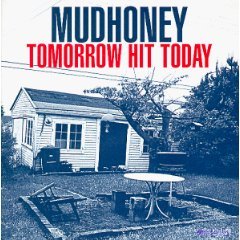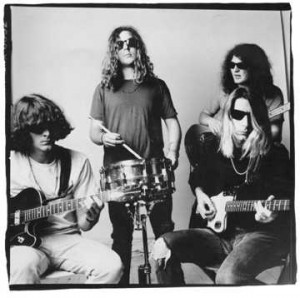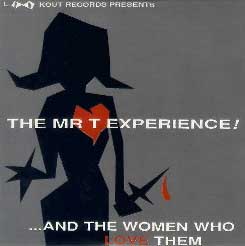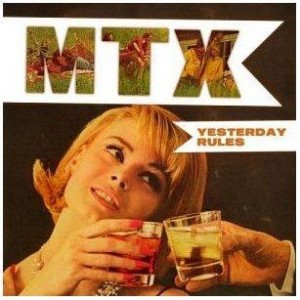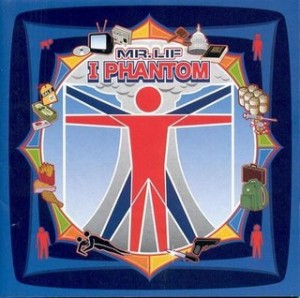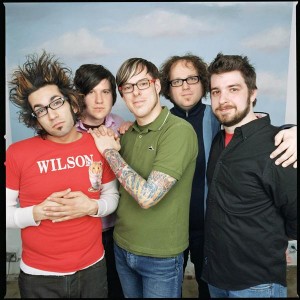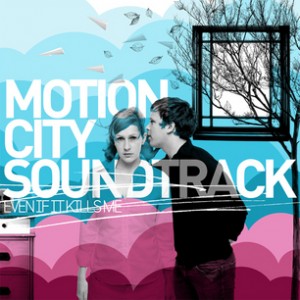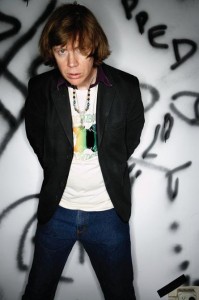 FOREWORD: Iconic Sonic Youth guitarist, Thurston Moore, gave me a tremendous overview of his sagacious noise-rock outfit in ’07. He was supporting solo project, Trees Outside The Academy, with a one-off gig with his Ecstatic Peace compatriots MV & EE with the Golden Road, Tall Firs, and Religious Knives. This article originally appeared in Aquarian Weekly.
FOREWORD: Iconic Sonic Youth guitarist, Thurston Moore, gave me a tremendous overview of his sagacious noise-rock outfit in ’07. He was supporting solo project, Trees Outside The Academy, with a one-off gig with his Ecstatic Peace compatriots MV & EE with the Golden Road, Tall Firs, and Religious Knives. This article originally appeared in Aquarian Weekly.
In his late teens, entrepreneurial Connecticut-raised guitarist-vocalist Thurston Moore was determined to go city bound, experience the wondrous joys New York afforded, and obtain a modicum of prosperity. There, he met his attractive leggy flaxen-blonde life partner, Kim Gordon, plus a few explorative youths, who’d mutually get involved professionally to reach an esteemed status infrequently attained by such ostensibly outré artistes. If co-founding legendary noise rockers, Sonic Youth, wasn’t enough, he befriended a gaggle of likeminded interdependent nonconformists (including free jazz dignitary, William Hooker) and set up Ecstatic Peace Records.
Recently, lanky busybody Moore dropped his belated second solo album, Trees Outside The Academy, an illuminating navigation fraught with the same penetratingly obscurant symphonies his primary outfit continually delivers in spades. Yet there’s a halcyon acoustical solemnity somewhat foreign to Sonic Youth that differentiates this abstruse solo affair. It’s fair to say he remains lucidly vibrant despite arriving at the ripe golden age of fifty.
THE BEGINNING
Precociously intellectualized no wave junkies sprung forth by lower Manhattan’s late ‘70s noise addicts and neo-punk fugitives, Sonic Youth began inauspiciously as a jaggedly clamorous art gallery aggregate unafraid of discerningly exploiting the Big Apple’s miscreant subterranean jungle. From the onset, guitarists Thurston Moore and Lee Ranaldo challengingly fused dissonantly de-tuned cacophonies and acrimoniously blared rock scrums with a calmly embellished sublimity, naively influencing shoegazers, grungemeisters, and scree-pop denizens of all stripes.
Peruse their early back-catalog for valiantly scabrous hit-or-miss endeavors, then move past ‘85s gruesomely perturbed primal conquest Bad Moon Rising to the acrimoniously convulsive corrosiveness of twin pillars Evol and Sister before ingesting the startlingly jolted investigations swamping cherished ’88 magnum opus, Daydream Nation. The latter contains fiery MC5-nuzzled anthem “Teen Age Riot” and explosive hardcore peculiarity “Silver Rocket,” durably combustible fugues that blew away expectations and sent shock waves through the nascent post-punk underground.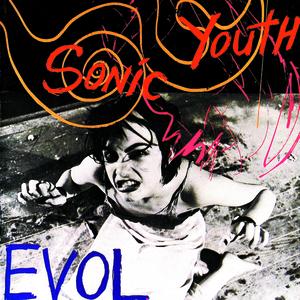
Moore explained the magical happenstance that brought Sonic Youth together in thorough discourse.
“In 1980, living downtown, everyone knew each other. It was more of a small town vibe. The no wave scene centered around Max’s Kansas City, CBGB’s, the Mudd Club. Then, bigger places like Hurrah, Danceteria, and Peppermint Lounge started hopping. Kim and I were there. I met Lee because he played in a band I was in earlier. At that time, I was in the Coachmen and he was in Flux. We played CB’s audition night together, had a similar vibe, and kept an eye on each other. I noticed him in (discordant freeform mentor) Glenn Branca’s band. He was a very interesting guitar experimentalist I knew peripherally. Glenn had put an ad in Soho Weekly for a guitarist. I didn’t get the job, but Kim knew him. She said Glenn wanted to rein me in ‘cause I was too wild. Lee didn’t join us then. We had another girl doing keyboards and used Dave Keay, the Coachmen drummer.”
Asked to curate an experimental music festival at Spring Street’s White Columns gallery, a nightly fling turned into nine exhilarating nights juxtaposing weird punks with the likes of masticating old guard provocateurs, MARS (re-formed under witty pseudonym, Don King). Branca did a new piece with full ensemble, the formative Sonic Youth performed, and Ranaldo (with Flux drummer in tow) rendered “Avoidance Behavior,” the harshest, loudest, most intense festival offering.
“Our keyboardist decided not to play, so East Village kid, Richard Edson, whom we found on recommendation, joined. He was acting in Jim Jarmusch’s film, Stranger Than Paradise. We got another gallery gig and asked Lee, who was our age and doing similar music, to join.” Moore adds, “The name Sonic Youth had no cache at the start. Ed left so we picked up drummer Bob Bert (future Chrome Cranks/ Knoxville Girls/ International Shades consort). He was critical. He answered a flyer I’d put up all over town. We hired him on the spot. He was our Jersey connection and played with a few Maxwells acquaintances. We were touring quite a bit through Europe. He tired of it and probably wanted to change direction anyway. Then, Pussy Galore came to Hoboken from DC and he joined them, providing clattering drums and a radiator. I was going to CBGB’s hardcore matinee shows and Steve Shelley (entered the fold). He was in Lansing, Michigan’s hardcore band, Crucifucks, a radicalized unit with an older singer who had absurdist lyrics like ‘Hinckley had a vision,’ ‘Democracy spawns bad taste,’ and “Cops For Fertilizer.” I bought the Crucifucks demo tape from the back of Maximum Rock And Roll and he wrote me. He was also in very good avant-garde troupe, Strange Fruit. He was gonna leave Crucifucks for San Francisco, but took my advise and headed for New York.”
ABOVEGROUND FAME
Sonic Youth grew up in public, learning chordal structures and basic scales over time, diving headlong into creative finessing in order for their first forays to feel special. The culmination of matured songwriting and freshly expansive arrangements alleviated the restrictive constraints placed upon less inventive luminaries. Boldly uncompromising shrine, Daydream Nation, became a magnanimous double-album defying odds just as former SST label mates the Minutemen and Husker Du did years earlier with broadened landmarks Double Nickels on the Dime and Zen Arcade.
“Kim and I went to see Anton Corbijn’s Joy Division film, Control, and she was remarking how it’s the first rock biopic that ‘gets’ what it’s like being in a band,” he shares. “It’s very sublime. There’s no drug exploitation and bad rock and roll behavior – it’s there, but not focused upon.”
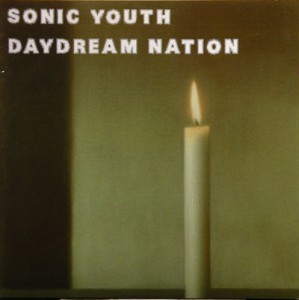 By the late ‘80s, Sonic Youth indirectly helped steer the course of popular culture. The whole British shoegaze movement that cropped up during ’85 profited from their dynamic sustained tension and flailing guitar maneuvers. My Bloody Valentine, Jesus & Mary Chain, and Ride seized the opportunity, countering revelatory cataclysmic fierceness with warmer fuzz-toned intimacies. By 1990, the oncoming Seattle landscape would forever be altered as the grunge explosion gained universal acceptance. The Melvins, Mudhoney, and Nirvana fully adapted Sonic Youth’s emblematic cranked-up metallurgic heft and droning downbeat skronk for a chilling screech still transversely reverberating.
By the late ‘80s, Sonic Youth indirectly helped steer the course of popular culture. The whole British shoegaze movement that cropped up during ’85 profited from their dynamic sustained tension and flailing guitar maneuvers. My Bloody Valentine, Jesus & Mary Chain, and Ride seized the opportunity, countering revelatory cataclysmic fierceness with warmer fuzz-toned intimacies. By 1990, the oncoming Seattle landscape would forever be altered as the grunge explosion gained universal acceptance. The Melvins, Mudhoney, and Nirvana fully adapted Sonic Youth’s emblematic cranked-up metallurgic heft and droning downbeat skronk for a chilling screech still transversely reverberating.
Signed to major label, Geffen, Sonic Youth thereafter prospered when ‘90s weighty Goo and ‘92s dungy Dirty wavered with conventionality, climaxing with ‘94s skull-fucked blooze concision, Experimental Jet Set, Trash, and No Star (featuring somniferous Gordon-whirred helix “Bull In The Heather”) plus its superior dilated conniption, Washing Machine.
“By Experimental Jet Set, we’d stepped away from the heavioisity, went against the grain, and got inspired by interestingly introspective contemporary music by Lou Barlow (Sebadoh), Pavement, and Royal Trux. That was more important to us than what was being championed with the success of indie rockers getting into Nirvana,” Moore admits. “Afterwards, one major change was Kim focusing more on guitar than bass. Beforehand, she was playing bass almost exclusively. We became a three-guitar-and-drum band for a few albums and tours. The only low end for awhile came from the knick drum. That was bizarre and cool.”
Fortuitously, following ‘98s specious drone-bludgeoned protraction, A Thousand Leaves, respected Chicago-based producer-multi-instrumentalist Jim O’Rourke entered the fold, first as a collaborating ‘ideas man’ for histrionically dismissive poetry-plodded excursion, NYC Ghosts and Flowers, then full-time on ‘02s bewitchingly contemplative masterstroke Murray Street. Beautiful spindly opener, “The Empty Page,” tempers the usual brutal tumult. And a maze-like neo-Classical grandiloquence underscores the serene folk proclivities defying the fuzzily squelched bluster consuming the harrowing balance.
“We became a five-piece with Jim. It was a gradual progression. We felt Sonic Youth was so idiosyncratic it’d be difficult to incorporate anyone into the band. Jim had a good read as to what we were doing aesthetically without selling his own goals out. He interacted with us in a real interesting way,” Moore claims before recalling the tragic circumstances affecting their next project. “After 9-11, the Murray Street neighborhood we worked at got blasted. We needed special passes from the city to get down there. It was off-limits to the public. That atmosphere made Murray Street both sentimental and direct. We took after rock history and named an album after its environs, like Abbey Road or Folsom Street. Much was inspired by Italian photographer Stefano Giovannini’s picture of the corner street sign, which withstood the shock of the blast. You could see dust on top of this beautiful sign.”
Nearly as impressive, ‘04s perilous Sonic Nurse ambitiously re-visited the now-distant past without scoffing the hauntingly vicious savagery of yore. Gordon’s black magic charm imbeds “Pattern Recognition” and her crackled ‘baby breakdown’ evokes lipstick traces of alt-chick Liz Phair on addictive hard-candied schoolyard crush, “Kim Gordon And The Arthur Doyle Hand Cream.” Sweet soulful serenade, “Dude Ranch Nurse,” also easily sufficed.
“That record was the most successful as far as fitting lots of noise to pop structures without separation. The material was unified and couldn’t be dissected so much. We were trying to blur the boundaries using extreme elements with more traditional ones,” says Moore.
Amazingly, Sonic Youth’s final album with O’Rourke, ’06s Rather Ripped, includes two of their finest accessible numbers, the sunshine-y white soul spangle, “Reena,” and the flinty crepuscule sear, “Incinerate.” It proved they could rejuvenate bygone conceptual designs with renewed panoramic vigor sans predisposed posturing or pretentiously pious posing.
“I’d like to think Rather Ripped is as good as anything on rock radio – which has become decrepit,” gripes Moore. “There’s some cool college stations and I review records for Arthur magazine and gets lots of promos. But I’ll buy records. I like mostly avant-garde stuff and Kim’s been listening to Norwegian death metal lately. Finding time to listen is difficult, but I like the fact there’s so much good stuff out there.”
GONE SOLO, AGAIN
As for Moore’s solo ventures, ‘95s minimalist Psychic Hearts benefited from short, fast, sharp tunes and lyric-driven perspicacity. Its skeletal riff fabric and frantic repetition beg comparisons to The Fall. Meanwhile, ‘07s versatile Trees Outside The Academy elevates solemn dirges, mystic pop, and surreal instrumentals with pastoral acoustic accouterments. “Tough yet sweet New York City girl,” violinist Samara Lubelski, brings further melodic mellifluence and gorgeously subtle touches while Sonic Youth partner, Shelley, keeps time. Charalambides’ Christina Carter enjoins Moore on lovely Anglo-folk duet, “Honest James,” and Sunburned Hand Of The Man’s John Moloney piles on propulsive skins to hastening rampage “Wonderful Witches.”
Concerning similarities and variances to his main band, Moore infers, “I feel freer. As far as lyrics go, they’re not shared enterprises. I’m sensitive that Sonic Youth’s a democratic vision. So there’s a different vibe. Psychic Hearts was ‘first thought-best thought’ and was done in two days. Trees is completely different. Instead of a second guitar, there’s violin. I’m a different person in a different world informed by rural Massachusetts instead of New York. “Honest James” and “American Coffin” are influenced by the culture of tragedy in America. We’re dealing with the conflict to do the right thing while war looms. War’s always informative for every artist unless they ignore it and hope it goes away. You try to rise above and write intellectually from that perspective. But I don’t have any conscientious ideas when I’m writing. It’s ‘of the time.’ Lyrics play with language. I always loved Blue Oyster Cult’s “experiments that failed.” That was a great line. They had a mystical scientist vibe going through songs. I always reference Tyranny & Mutation as a heavy document in my life. I’ve wanted to do a cover of their “Career Of Evil.” In Sonic Youth, I usually transpose songs from acoustic to electric. I didn’t make that move on Trees and that gave it a distinctive sound. Playing live, I’ll do a handful of songs on electric guitar.”
 Trees Outside The Academy maintains a trebly tone due to the quiet ambience and echoing open space at old friend (and Dinosaur Jr. mastermind) J. Mascis’s Bisquetten Studio, located beside Paradise Pond across from Smith College in bucolic Amherst. Moore dabbled with calling the album Zero Hour, but let that slide. Serendipitous straight-up love trinket, “Fri/end,” shows appreciation for the married life, the striking instrumental title cut hearkens back to classic Pete Townshend a la Tommy, and skittishly bittersweet sanctuary “Off Work” burrows into the mind’s recessive nooks. Just keep an eye out for the disgruntled ‘language meanies’ infiltrating “Wonderful Witches.”
Trees Outside The Academy maintains a trebly tone due to the quiet ambience and echoing open space at old friend (and Dinosaur Jr. mastermind) J. Mascis’s Bisquetten Studio, located beside Paradise Pond across from Smith College in bucolic Amherst. Moore dabbled with calling the album Zero Hour, but let that slide. Serendipitous straight-up love trinket, “Fri/end,” shows appreciation for the married life, the striking instrumental title cut hearkens back to classic Pete Townshend a la Tommy, and skittishly bittersweet sanctuary “Off Work” burrows into the mind’s recessive nooks. Just keep an eye out for the disgruntled ‘language meanies’ infiltrating “Wonderful Witches.”
Moore elucidates, “The language poets of St. Mark’s Poetry Center came onto the scene with an academic take on poetic verse. What preceded them – Frank O’Hara and Allen Ginsberg – was a more confessional style celebrated by Ted Berrigan, the big man on campus at St. Mark’s. But academic nerds came in with ideas of how poems don’t need narrative sense. It was about how words looked on the line. It’s an interesting approach I’m respectful of. But Berrigan, back in the day, talked about the influx of language poets and said, ‘Watch out for those cold-hearted language meanies.’ He thought they were tight asses with shirts buttoned up to the neck. And he was a bearded cigarette-smoking hamburger-munching free soul.”
When asked whom he hates more, elitist avant-garde snobs or anti-intellectual pop stars, Moore laughs, then answers, “I love ‘em both equally. I have a soft spot for pretentious intellectuals. But if they become totally insufferable I run the other way. I’ll call their bluff. If they put on airs of superiority, I’ll take them to task. That’s when you steal their hubcaps. Money’s the great equalizer.”
EPHEMERAL STUFF
Should Sonic Youth be considered for the Rock & Roll Hall Of Fame alongside pioneering ‘80s groups the Minutemen, Replacements, and Black Flag? Or will the powers-that-be skip these true innovators and only give props to better-received contemporaries U2 and REM?
Moore insists, “There’s a committee the industry lobbies. Our management has talked about being considered. But you have to start six to eight years before consideration is granted. As a contemporary working band… I mean, is (cross-grained funk-soul legend) Bobby Byrd in. Probably not. But Madonna’s in.”
In springtime ’08, a pictorial essay venerating the late ‘70s no wave scene, rigidly edited by Moore and journalist Byron Coley, will see the light of day. Only the true architects of no wave will be featured: MARS, D.N.A., Lydia Lunch, James Chance, and Teenage Jesus & the Jerks. Moore felt he had the obligatory authority to unleash such a vital collection since he lived through the entire scene and witnessed firsthand the oft-times unheralded originators involved. 98% of the snapshots are said to have been unpublished.
Now distributed by colossal Universal Records, Moore’s thriving Ecstatic Peace label is home to some of the absolute finest youthful bands making the scene. There’s Nashville garage-punks Be Your Own Pet, abrasive Hartford menaces Magik Markers, Bushwick-via-Ann Arbor nihilists Awesome Color, and Boston psych-blues spankers Black Helicopter, a veritable wellspring of reliable musical artistry sure to please any gourmandizing freak.
Controversially, Sonic Youth plan to release a comprehensive Starbuck’s compilation assembled by artists, novelists, actors, and musicians who’ve name-checked the invigorating crew over the years.
Moore defends the corporate-sponsored accord by asserting, “Tower Records went bankrupt. Places to buy recordings are drying up. Starbuck’s loved the idea. But we needed to give them one exclusive song, so we did a real outsider tune. We had a photo of a young yuppie businessman wearing IPOD headphones slouched back looking out the window. We also had pictures they’d never consent to use. A college kid slumped over sleeping on a Starbuck’s table with homework. A homeless guy slumped on a chair with Starbuck’s cups at his feet.”
It appears obvious Sonic Youth would appeal more to the slumbering university student and the down-and-out vagrant drifter than the typical slick Starbuck’s customer, but don’t underestimate the enormous impact they’ve already had on business professionals. Aren’t they the ones who initially bought Nirvana’s Nevermind when they were young over a decade ago?
FOREWORD: Undoubtedly one of America’s best young art punk outfits, No Age have continued to advance and expand their sound. 2010′s Everything In Between, influenced by sensational unheralded ’90s act Disco Inferno, shuns conventionality and evades most preconceptions. This article originally appeared in Aquarian Weekly during 2008.
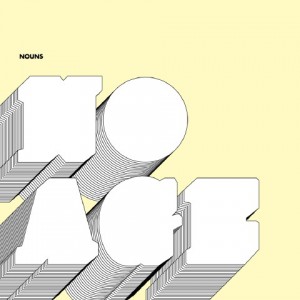
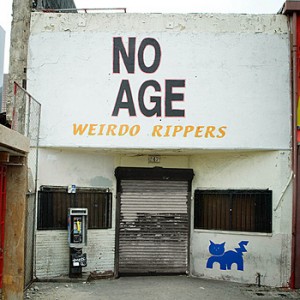 Retaining a restlessly subversive attitude, the uncompromising No Age have no trouble piercing rock’s wildly spectral boundaries. Looking backwards for a moment, their uninhibited approach completely emboldened the white noise disfigurements consuming Weirdo Rippers, hearkening back to the blaring cacophonous shimmer Jesus & Mary Chain perfected in the mid-eighties. Dissonant commencing overture, “Every Artist Needs A Tragedy,” plies shards of mangled metallic scraps to a tortured artist lampoon. Pounding drums and slashing cymbals drill across “Boy Void’s” trashy lo-fi tempest, going from shallowly muted to dynamically up-front. The same obtuse contrasts distinguish swinging rock and roll scrambler, “My Life’s Alright Without You,” as it vacillates between muzzled faraway dungeon blear to blazingly in-your-face intimidation. Coming out of three minutes of lazily meandering free form sludge, “Dead Plane” unexpectedly drifts into a blurry Ramones-styled adolescent frenzy before taking flight like a big ol’ jet.
Retaining a restlessly subversive attitude, the uncompromising No Age have no trouble piercing rock’s wildly spectral boundaries. Looking backwards for a moment, their uninhibited approach completely emboldened the white noise disfigurements consuming Weirdo Rippers, hearkening back to the blaring cacophonous shimmer Jesus & Mary Chain perfected in the mid-eighties. Dissonant commencing overture, “Every Artist Needs A Tragedy,” plies shards of mangled metallic scraps to a tortured artist lampoon. Pounding drums and slashing cymbals drill across “Boy Void’s” trashy lo-fi tempest, going from shallowly muted to dynamically up-front. The same obtuse contrasts distinguish swinging rock and roll scrambler, “My Life’s Alright Without You,” as it vacillates between muzzled faraway dungeon blear to blazingly in-your-face intimidation. Coming out of three minutes of lazily meandering free form sludge, “Dead Plane” unexpectedly drifts into a blurry Ramones-styled adolescent frenzy before taking flight like a big ol’ jet.